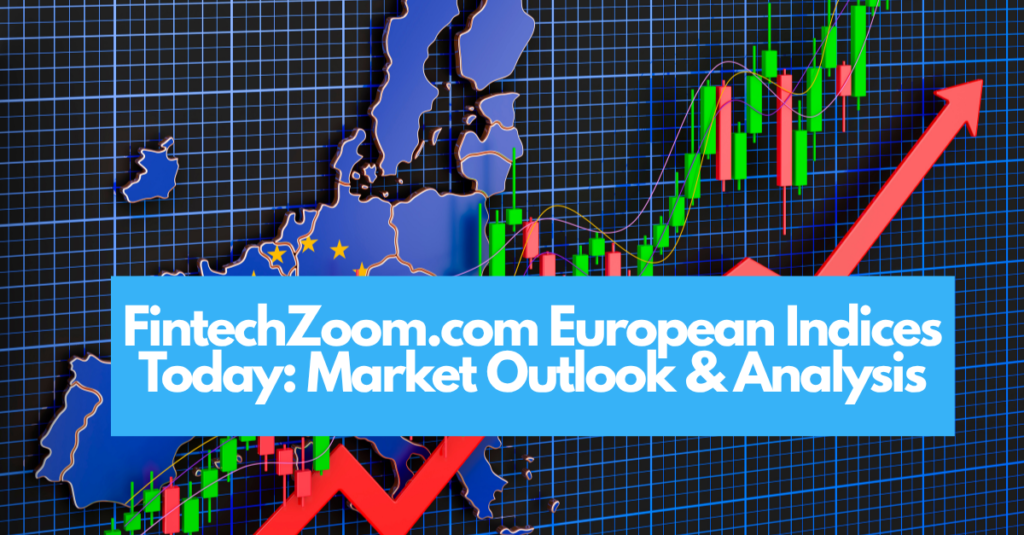International investors closely watch European stock markets, as they serve as key indicators of economic strength, corporate performance, and investment trends. Platforms like FintechZoom.com European Indices Today offer real-time data, market analysis, and performance insights, enabling traders and long-term investors to track the performance of major indices such as the FTSE 100, DAX 40, CAC 40, and Euro Stoxx 50.
- Overview of current developments in the European market
- Real-time market monitoring
- Major European Stock Indices
- Trends on the European Stock Market Today
- Factors Influencing European Indices
- Historical Performance Trends
- Contributions from the Sector
- Trading and Investment Strategies
- Risks and Considerations
- How FintechZoom.com Empowers Investors
- Future Prospects
- Conclusion
- FAQs
These indices reflect how sectors such as banking, energy, technology, and consumer goods react to economic data, corporate profits, political developments, and global trade. Because European markets play a significant role in global finance, their movements often influence currency trends, cross-border investments, and overall investor sentiment worldwide.
Below you will find a detailed overview of today’s performance of European indices, the main factors determining market direction, sector-level trends, and key developments that investors should keep an eye on throughout the trading day.
Overview of current developments in the European market
European markets opened mixed as investors analyzed corporate earnings, geopolitical developments, and shifting interest rate expectations in the eurozone and the UK. Major indices such as the DAX 40, FTSE 100, CAC 40, and STOXX Europe 600 showed moderate fluctuations in early trading.
Market sentiment was influenced by expectations regarding the policies of the European Central Bank and the Bank of England, as well as by fluctuations in energy prices and updated economic data.
Real-time market monitoring
FintechZoom.com European Indices Today offers live updates to keep investors informed throughout the trading day. Real-time tracking allows investors to:
- Track the price movements of the major indices within a trading day.
- Track performance trends by sector.
- React quickly to economic news.
- Compare percentage gains and losses in different markets.
- Identify patterns of short-term volatility.
This structured approach promotes faster decision-making while maintaining a focus on long-term investments.
Major European Stock Indices
FTSE 100
The FTSE 100 comprises the 100 largest companies listed on the London Stock Exchange. The index is weighted by market capitalization, meaning companies with higher share prices have a greater influence on the index. Sectors such as financials, energy, and consumer goods play a significant role. The FTSE 100 is an important benchmark for European investors and provides insights into the British economy.
Daily performance:
The FTSE 100 posted slight gains today, led by strong energy and bank stocks. Commodity companies had a particularly large impact, as fluctuations in oil and gas prices weighed on the index. The Bank of England’s forecast and lower inflation figures boosted investor confidence, while retail and consumer goods companies reported mixed results due to global logistics issues.
DAX 40
The German stock index DAX 40 tracks the performance of the 40 largest companies listed on the Frankfurt Stock Exchange. Known for its strong industrial and technology companies, the DAX 40 often reflects the export-oriented German economy. Changes in global trade, currency fluctuations, and industrial production significantly impact this index.
Daily Developments:
The DAX showed moderate volatility today. Automotive stocks fluctuated amid updates to commodity prices, while industrial companies reported solid results. Technology companies saw isolated gains ahead of their quarterly reports. Energy stocks reacted to changes in natural gas and oil prices. The latest inflation and employment figures from Germany further weighed on sentiment, keeping the index within a narrow trading range.
CAC 40
The CAC 40 is an index of the largest publicly traded companies in France and serves as a benchmark for the French economy. Sectors such as luxury goods, banking, and energy dominate the index. Changes in consumer demand, political decisions, or the European Central Bank’s policies can influence the performance of the CAC 40.
Daily performance:
The CAC 40 remained stable today. Luxury brands benefited from strong international demand, while industrial stocks performed mixed due to energy costs and export pressure. Financial stocks posted moderate gains, while technology and telecommunications stocks fluctuated in line with global semiconductor-sector trends. The defense and aerospace industries proved resilient.
Euro Stoxx 50
The Euro Stoxx 50 is a blue-chip index comprising 50 leading companies in the Eurozone. It offers a comprehensive overview of economic trends across various countries and sectors and is therefore popular with international investors.
Daily performance:
The Euro Stoxx 50 index presented a mixed picture, reflecting regional sector shifts. Healthcare companies rose slightly, financial stocks remained stable, while technology and consumer goods companies delivered mixed results. Energy stocks climbed slightly amid developments in commodities, highlighting the varying economic conditions across the Eurozone.
Trends on the European Stock Market Today
| Index | Entry Level | Midday Trend | Exit Options |
| FTSE 100 | 7,850 | High | Low profit |
| DAX 40 | 15,620 | Mixed | Close range |
| CAC 40 | 7,120 | High | Balanced |
| Euro Stoxx 50 | 4,250 | Mixed | Light up |
Factors Influencing European Indices
European stock indices react to various factors that can create volatility or growth opportunities:
Economic data
GDP growth, employment statistics, inflation figures, and industrial production influence investor expectations and index performance.
Central bank policy
Decisions by the European Central Bank, the Bank of England, or other regional banks regarding interest rates, quantitative easing, or economic stimulus measures affect market liquidity and valuations.
Corporate profits
The earnings figures of companies in major indices influence share prices and, by extension, the entire index. Both positive and negative surprises often lead to significant price movements throughout the trading day.
Geopolitical events
Trade agreements, sanctions, elections, or international conflicts can disrupt markets and affect investor sentiment across Europe.
Currency movements
Fluctuations in the euro, the pound sterling, or other regional currencies affect the profits and valuations of multinational companies. A stronger euro can weaken the competitive position of exporting companies, while a weaker euro can increase profits abroad.
Market sentiment
Investor psychology, influenced by global news, forecasts,s and market trends, contributes to the short-term volatility of European indices.
Historical Performance Trends
Analyzing historical data provides the context for current index movements:
- FTSE 100: Historically stable, with strong performance in the financial and energy sectors. The index is sensitive to news about Brexit and British economic data.
- DAX 40: Exhibits higher volatility due to its export orientation. Peaks often occur during periods of global industrial growth.
- CAC 40: Moderate volatility with a constant influence from the luxury goods and banking sectors. Its performance closely follows the economic trends of the Eurozone.
- Euro Stoxx 50: Offers a diversified view of the region. Heavily influenced by the performance of German, French, and Dutch companies.
Contributions from the Sector
Different sectors have different effects on European indices:
- Financial services: Banks and insurance companies often cause large market fluctuations.
- Energy and utilities: Oil, gas, and renewable energy companies influence the index depending on commodity prices and energy policy.
- Technology and industry: Innovation and manufacturing have a significant influence on the DAX 40 and the Euro Stoxx 50.
- Consumer staples and luxury goods: Companies in these sectors influence sentiment in the CAC 40 and across the entire European market.
Trading and Investment Strategies
Investors use different strategies for trading European indices:
- Index funds and ETFs: Offer a diversified investment strategy without the need to buy individual stocks.
- Options and futures: Advanced instruments for hedging risks or speculating on market fluctuations.
- Sector rotation: Investments are shifted among sectors to capitalize on performance trends.
- Technical analysis: Use of historical price patterns, support and resistance levels, and indicators to predict short-term price movements.
- Fundamental analysis: Evaluation of corporate profits, economic data, and geopolitical factors to support long-term decisions.
Risks and Considerations
Trading in European indices presents both opportunities and risks:
- Volatility: Rapid price fluctuations can affect portfolios, especially during the reporting period or in response to geopolitical events.
- Currency risk: Investments in foreign companies expose investors to currency fluctuations.
- Economic uncertainty: Recessions, inflation, or political changes can negatively impact the index’s performance.
- Liquidity risk: Although the major indices are highly liquid, the trading volumes of individual stocks within them may be lower.
How FintechZoom.com Empowers Investors
FintechZoom.com offers investors real-time updates, expert analysis, and practical insights into European indices. Key features include:
- Live index updates: Track the FTSE 100, DAX 40, CAC 40, and Euro Stoxx 50 in real time.
- Market analysis: Clear commentary on economic data, company performance, and industry trends.
- Historical tools: Diagrams and archives for identifying long-term patterns.
- Investment advice: Tips on diversification, risk management, and strategic positioning.
- Global news integration: Reporting on geopolitical events and political changes.
By combining data with expert knowledge, FintechZoom.com helps both beginners and professionals to make informed decisions on the European stock markets.
Future Prospects
European indices continue to reflect both regional and global economic conditions. Investors should pay attention to the following:
- Political changes by central banks in the Eurozone and the United Kingdom
- Patterns of economic recovery after the pandemic
- Corporate profits and industrial production
- Geopolitical developments with implications for trade and investment flows
- New technologies and industry innovations that impact industrial and technology-oriented indices
FintechZoom.com offers forecasts and real-time updates to help investors adapt quickly to these trends.
Conclusion
European stock indices offer valuable insights into the economic situation and performance of companies in the region. Through FintechZoom.com European Indices Today, investors can track developments in real time, analyze trends, and make informed decisions. By understanding industry contributions, market drivers, and historical patterns, both novice and experienced investors can confidently navigate the dynamic European markets.
FAQs
Q: What are the most important European stock indices?
A: The FTSE 100, DAX 40, CAC 40, and Euro Stoxx 50 are the most important indices that represent large companies in Europe.
Q: What influence do European indices have on global markets?
A: They provide information about the economic situation of a region and can influence the sentiment of global investors as well as investment flows.
Q: What factors influence the performance of European indices?
A: Economic data, central bank policy, corporate profits, geopolitical events, currency fluctuations, and market sentiment.
Q: Can beginners also invest in European indices?
A: Yes, using index funds or ETFs is a simple and diversified way for beginners to gain access to the market.
Q: How does FintechZoom.com help track these indices?
A: FintechZoom.com offers live updates, historical charts, expert analysis and market news for informed investment decisions.
Q: Which sectors have the greatest influence on European indices?
A: The financial, energy, industrial, technology, consumer goods and luxury goods sectors have a significant influence.
Q: Are European indices volatile?
A: This can happen, especially with economic announcements, geopolitical events, or when profit figures are published.
Q: What is the best strategy for investing in European indices?
A: For most investors, diversifying the portfolio using ETFs or index funds in combination with monitoring market trends and economic indicators is recommended.




